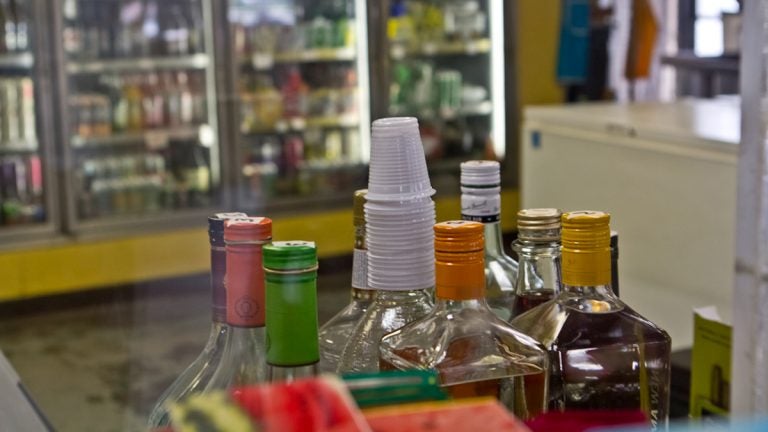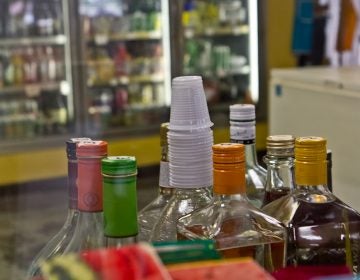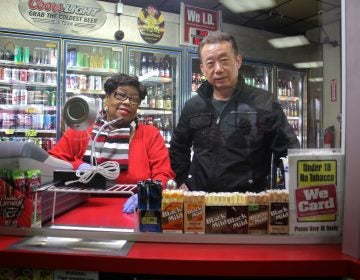Philly councilwoman wants to ban plastic barriers in stop-and-go businesses
Employees at stop-and-gos are routinely shielded in plastic glass for protection. Customers make their purchases through a window in the barrier.

Plastic glass shields shots of liquor for sale at a stop-and-go in the Sharswood section of North Philadelphia. (Kimberly Paynter/WHYY)
City Council plans a hearing Monday to discuss controversial legislation that could bar “stop-and-go” businesses from selling liquor and beer from behind plastic glass.
The measure, introduced by City Councilwoman Cindy Bass, would create two new restaurant licenses under the city’s health code.
Businesses that secure a “small establishment” license, such as a takeout restaurant, would be able to use a plastic barrier.
Businesses that get a “large establishment” license would have to provide seating for at least 30 people, a publicly accessible bathroom for customers, and no “physical barrier” between staff and customers.
Employees at stop-and-gos, common in low-income neighborhoods, are routinely shielded with plastic for protection. Customers make their purchases through a window in that plastic wall.
“It’s an indignity to be served food through a Plexiglas window in a restaurant. You don’t see it in Chestnut Hill, where I also represent. You don’t see it in Center City restaurants,” said Bass.
Bass, who also represents Mt. Airy and Germantown, said the barrier poses a safety hazard.
“What if your customer is choking? What if there’s an allergic reaction? These are things that are very important,” said Bass, adding that public safety wouldn’t be at risk because other businesses near stop-and-gos, such as bars, don’t have the plastic shields.
The legislation doesn’t spell out any penalty for violations should the measure become law.
And the city doesn’t have the power to suspend or revoke liquor licenses issued by the state.
In a statement, a spokesman for the Pennsylvania Liquor Control Board said “there is nothing in the Liquor Code or the Pennsylvania Liquor Control Board’s regulations that either requires or precludes the installation or use of bulletproof glass by businesses licensed to sell alcoholic beverages.”
At the end of October, Gov. Tom Wolf signed legislation that gives the board the ability to immediately suspend stop-and-go licenses if the business does not comply with the code.
State law requires stop-and-gos to be at least 400 square feet, have seating for a minimum of 30 people, and have enough food to serve that many customers.
Business owners can appeal suspensions to Commonwealth Court.
The PCLB recently kicked off an awareness campaign aimed at teaching stop-and-go owners about the new law. The agency will begin enforcing the measure in January.
WHYY is your source for fact-based, in-depth journalism and information. As a nonprofit organization, we rely on financial support from readers like you. Please give today.






